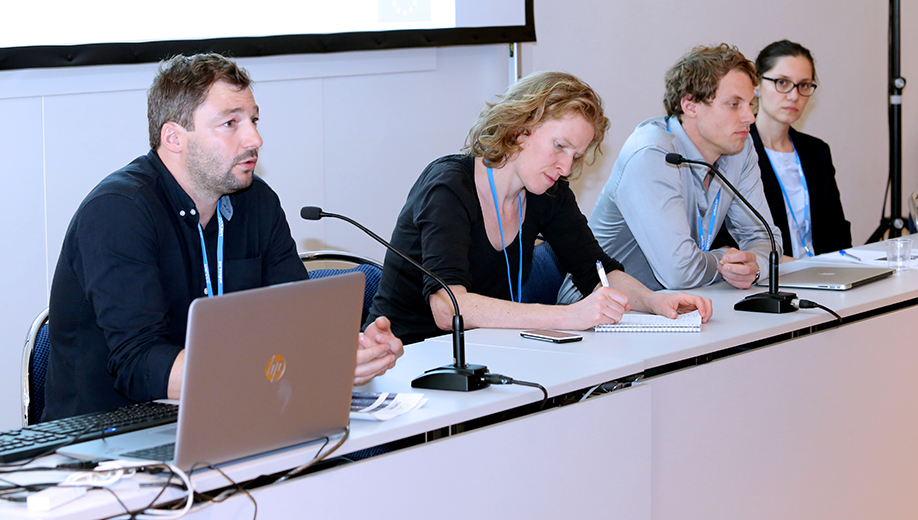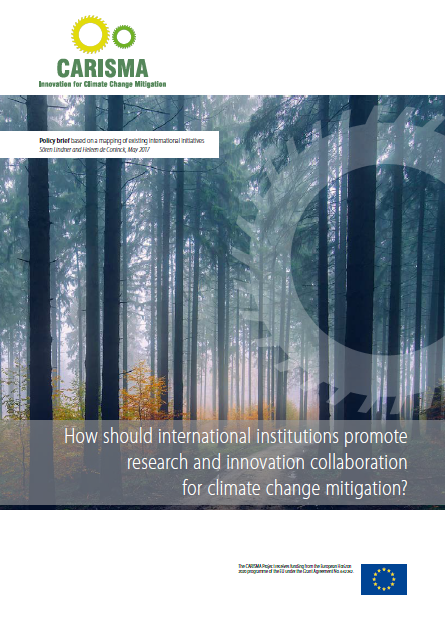Global Research and Development Cooperation in Climate Technologies: Opportunities and Challenges
 On Thursday 18 May 2017, JIN Climate and Sustainability co-organised the CARISMA side-event on Global Research and Development Cooperation in Climate Technologies: Opportunities and Challenges at the UNFCCC Bonn Climate Change Conference. The side-event explored the implications of global research and development (R&D) cooperation, including with emerging economies, on development and transfer of mitigation technologies. The event was moderated by Heleen de Coninck of Radboud University. On the picture (credit: IISD ENBOTS) from left to right: Ulrich Elmer Hansen (UNEP DTU Partnership), Heleen de Coninck and Sören Lindner (Radboud University), and Martina Lyons (European Commission).
On Thursday 18 May 2017, JIN Climate and Sustainability co-organised the CARISMA side-event on Global Research and Development Cooperation in Climate Technologies: Opportunities and Challenges at the UNFCCC Bonn Climate Change Conference. The side-event explored the implications of global research and development (R&D) cooperation, including with emerging economies, on development and transfer of mitigation technologies. The event was moderated by Heleen de Coninck of Radboud University. On the picture (credit: IISD ENBOTS) from left to right: Ulrich Elmer Hansen (UNEP DTU Partnership), Heleen de Coninck and Sören Lindner (Radboud University), and Martina Lyons (European Commission).
The side-event has been covered by the IISD Earth Negotiations Bulletin on the Side (ENBOTS) meeting coverage. A report of the side-event including pictures is available at the ENBOTS website: Highlights for Thursday, 18 May 2017. Presentations during the side-event were based on the outputs of CARISMA's work on international climate change mitigation research and innovation collaboration between the European Union and developing countries. In May 2017, two policy briefs and one working document on this topic have been published:
Working Document on international R&I collaboration on mitigation
This report aims at selecting collaboration initiatives on climate change mitigation R&D from governments, industries and regions, each with different characteristics, in order to identify criteria for effective collaborations between the European Union and emerging countries. The main finding of the analysis is that there is no unique pattern which could correspond to every good practice of collaborations. Depending on the scale and size of the project, the actors (regional, governmental or industrial) involved, the sector, and the type of activity (innovation, capacity building, knowledge sharing), optimal structures may vary. The report includes an overview of about 30 examples of R&D collaboration initiatives, along with six in-depth case study descriptions. The report can be downloaded here: ![]() CARSIMA_Working_Document_5_May_2017_Intl_RD_collaboration_mitigation.pdf1.17 MB.
CARSIMA_Working_Document_5_May_2017_Intl_RD_collaboration_mitigation.pdf1.17 MB.
Policy Brief based on a mapping of existing international R&D collaboration initiatives

![]() CARISMA_Policy_Brief_D7-1_existing_mitigation_RD_initiatives.pdf328.23 KB
CARISMA_Policy_Brief_D7-1_existing_mitigation_RD_initiatives.pdf328.23 KB
Policy Brief on government-led collaboration on climate change mitigation R&D
A second Policy Brief was prepared by Katja Tuokko, Monica Alessi, and Arno Behrens of the Centre for European Policy Studies (CEPS), titled "Government-led international research and innovation collaboration in climate mitigation: Practical guidance for policymakers". Based on the Working Document, and specifically for government-led initiatives, this Policy Brief summarises general lessons and recommends governmental policy makers to: (1) Improve coordination and communication between the partners’ government agencies to help manage expectations and achieve more concrete objectives; (2) Improve documentation and follow-up; (3) Clarify what constitutes a successful R&I initiative, e.g. in terms of potential impact on GHG emissions and technology transfer; and (4) Develop a user-friendly online database in which member states can present their initiatives and projects deriving from them in order to prevent overlap, increase synergies and simplify analysis.The Policy Brief can be downloaded here: ![]() CARISMA_Policy_Brief_D7-2_government-led_mitigation_RD_collaboration.pdf315.20 KB
CARISMA_Policy_Brief_D7-2_government-led_mitigation_RD_collaboration.pdf315.20 KB
#mitigationEU
More information on CARISMA project outcomes is available on the project website: www.carisma-project.eu. In addition, highlights of CARISMA and other EU-funded climate change mitigation research projects are shared on the www.climatechangemitigation.eu portal and the related #mitigationEU hashtag on Twitter.
